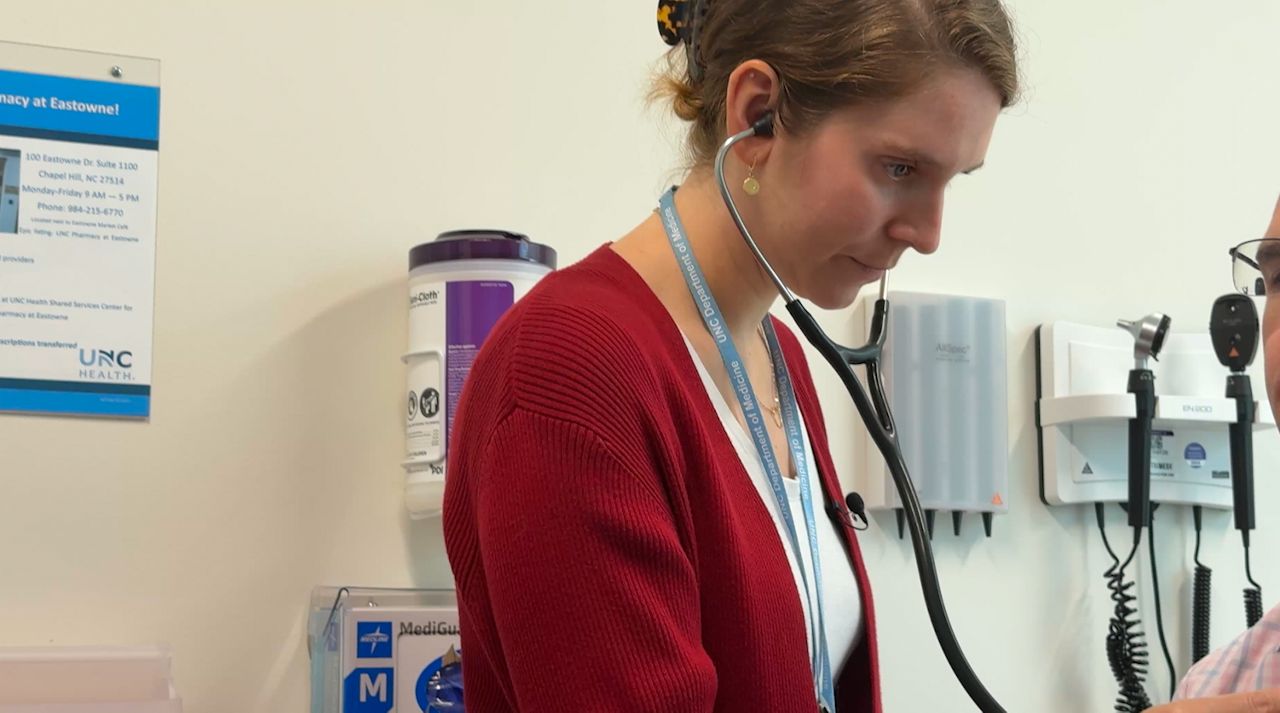RALEIGH, N.C. — What do phones, binging Netflix and staring at your computer screen all have in common? They can dry your eyes up quickly. An eye specialist says the pandemic exacerbated an ongoing problem — too much screen time.
Dr. Susan Watson said most people blink 15-20 times per minute
Increased screen time during the pandemic led to more dry eye disease
DED disrupts how your glands produce tears
Lisa Terwilliger said the therapy has worked for her
Dr. Susan Watson offers a potential remedy at her ophthalmology practice.
“We were already heading in that direction with our screen device use, and the pandemic created a situation where everybody was dependent upon screens,” Watson said.“We were already heading in that direction with our screen device use, and the pandemic created a situation where everybody was dependent upon screens,” Watson said.
If you were to stand in a patient room during this noninvasive procedure, you would see a lot of vivid light flashed directly at the area under the eyelids.
Lisa Terwilliger receives a dry eye disease treatment called OptiLight.
“How long have I known that they have been dry is about five years,” she said before the appointment.
Terwilliger said it took her about 20 years before looking into her symptoms.
According to the Mayo Clinic, DED is a condition in which your eyes are not adequately lubricated.
When a potential solution came into view, Terwilliger paid Watson a visit last year.
On the day Spectrum News 1 was invited to join a therapeutic session, Watson used OptiLight to target inflammation in two ocular areas: the eyelids and the surface of the eye.
One side effect of DED is the inconsistent production of tears. This instability means a person’s tears are not wet enough to properly lubricate the eye over time, which can manifest in the form of severe dryness.
Watson said the swelling in the eyelids are caused by Blepharitis. The American Academy of Ophthalmology describes Blepharitis as inflamed eyelids that “may appear red, swollen, or feel like they are burning or sore”.
In a Q & A portion of Watson’s website, Blepharitis is listed as an impaired eyelid function that can lead to DED.
“We use that too, as an advantage when someone has Blepharitis,“ Watson said. “Because there are organisms that live on the eyelids.
The makers of OptiLight touted their work as the first FDA-approved light therapy intended to treat DED. This product is made by Luminus.
“Most of the redness is inside inflammatory blood vessels,” Watson said.
The technology is supposed to reverse symptoms of redness, burning and scratchy sensations associated with DED that patients feel but may not see.
“We’re able to take a lot of the factors at play that create this imbalance and moderate them,” Watson said.
The greatest factor is often not enough blinking.
“Because I work on a computer eight hours a day,” Terwilliger said.
Modern comforts, like this 52-year-old’s at-home workstation, create hazards like blurry vision from staring for prolonged amounts of time.
“You are just going from screen to screen to screen with so much information and so much data,” she said.
The problem became bad enough she made sticky notes under the doctor’s orders.
“Once you incorporate them more, it becomes more of a habit as opposed to having to remember something,” Terwilliger said.
The pandemic has worsened a growing global issue. Lockdowns led to more people looking down at their smart devices. Research from international studies shows more than 50% of all participants surveyed had increased their screen time in 2020.
Published literature from the science journal Frontiers reviewed how excessive screen times manifested in people across the globe.
Simple after-work pleasures like reading became too much.
“After work I would want to read a book or watch TV, and my vision was compromised,” Terwilliger said. “Sometimes I would have to lay down and close my eyes for 5-10 minutes because my vision was not holding up.”
The constant strain on her eyes, neck and jaw took its toll.
It’s why Terwilliger said she was willing to try anything, including paying out of pocket for this light therapy even if it looks blinding.
“It’s got the bad stuff from the sunlight filtered out of it,” Watson said.
So far, Terwilliger said it’s working.
“I guess I described it as really having to let go and trust your doctor,” Terwilliger said.










